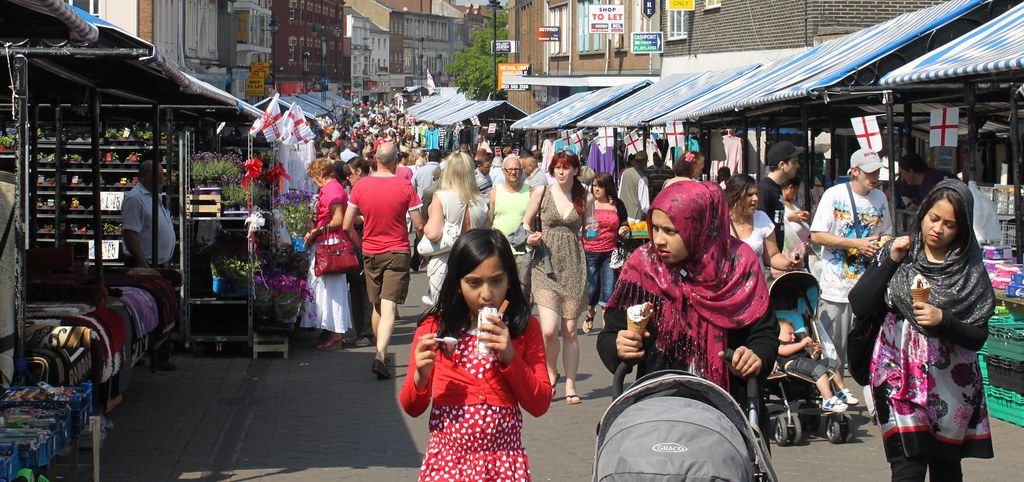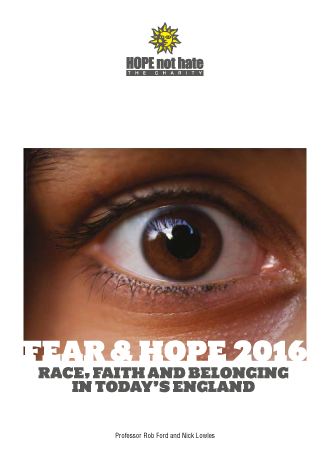Introduction
Fear and Hope 2016: New Hopes, Old Fears
Five years ago HOPE not hate launched a pioneering report investigating the new politics of identity in Britain. Much has happened since then. The far-right political party, the British National Party (BNP) has collapsed. The UK Independence Party (UKIP) has surged to prominence. Immigration to Britain has continued at record levels, despite the election of a government pledged to reducing it. The rise of ISIS and terror incidents in Woolwich, Paris and elsewhere have kept Islamic extremism in the headlines. A referendum on Scottish independence prompted new conversations about the future of the United Kingdom north and south of Hadrian’s wall. A second referendum in June of this year will once again bring a debate on Britain’s role and identity, this time centred on Britain’s relationship with the European Union. Rarely in British history have questions of identity been so central to political discussion. The biggest controversies in British politics today often hinge on who we are, how we are changing as a nation and where we want to go.
Our 2011 report revealed a nation fundamentally split into six “tribes” with very different outlooks and attachments. Two tribes – confident multiculturals and mainstream liberals – were positive about the effects of migration and social change, and hopeful about Britain’s future. But they were a minority, less than a quarter of the sample. At the other end of the spectrum were two other tribes – latent hostiles and active enmity – with deep seated fears about the impact of rapid social change, fears which often translated into active hostility, including (for a minority) support for the use of violence against groups perceived as a threat. The far-right BNP drew much of its energy and support from these tribes, which constituted a significant minority segment of around a quarter of the population.

Between the hopeful and the fearful lay the majority, in two „tribes“ wrestling with conflicting views about identity, social change and the state of Britain. Immigration ambivalents were insecure working class voters who worried about the impact of immigration on their communities and their economic circumstances. The culturally concerned were better off, but troubled by the impact immigration was having on British national identity and worried about immigrant integration.
Five years on, English attitudes have shifted in a more optimistic direction, which is perhaps surprising given the events of recent years. Respondents to the new Fear and HOPE 2016 survey were much more positive about personal and national progress, more economically secure, and less anxious about identity change.
They were also more positive about the impact of immigration, more comfortable with multiculturalism and more supportive of action against racial and religious hate speech.
This improvement in the national mood has also shifted the balance of power between the “tribes”. The liberal/multicultural tribes have grown, while the immigrant ambivalents (who see immigration and identity through the lens of economic security) and the active enmity group (totally hostile to immigration and disaffected from politics) have shrunk.
Even on attitudes to Islam as a religion and Muslims in this country have improved. Whilst there is still a deep cultural gulf, the overwhelming majority of English people believe it is wrong to stigmatise a whole religious group for the actions of an extremist few.
Old fears remain, but these too have moderated. The combined size of the two “hostile” tribes is almost the same in 2016 (24%) as in 2011 (23%). But the most hostile tribe – active enmity – a group which opposes everything about migration and multiculturalism, and will often consider violence as a means of expressing its opposition – has fallen away. Meanwhile the latent hostile group, which has similarly intense concerns but is much less keen on confrontation, has grown. Pessimism and anxiety remains widespread in the segments of British society where these tribes dominate, but those who hold such concerns are more willing now to look to traditional politics for solutions.
Our 2011 report, which is evident again now, found a clear correlation between economic pessimism and fear and hate.
The political expression of English identity has also been transformed over the past five years. The greater willingness of the tribes opposed to migration and social change to engage with politics is, in part, a reflection of the growing political prominence of UKIP, a party which gives voice to such concerns, and whose support base is dominated by members of the two “hostile” tribes.
At the other end of the political spectrum, the liberal and multicultural “tribes” now dominate Labour’s support base, due both to their own growth and to the departure of more anxious groups from the Labour electoral coalition. The balance of identity liberals and conservatives in the Conservative party is now much more even, too, presenting difficult challenges for the party of government as it decides policy on contentious identity issues.
The most immediate challenge is the coming referendum on Britain’s membership of the European Union (EU), where identity politics divisions will play a central role. The anxious/hostile tribes, which combine strong opposition to immigration, pessimism about cultural change and assertive English nationalism, gravitate towards the “leave” campaign. Their views look set to clash with those of liberal/multicultural groups, which combine a cosmopolitan worldview with pro-migration attitudes and optimism about the future, and already line up quite strongly behind the “remain” campaign.
However, much is still up for grabs in the “swing” identity segments: culturally concerned voters who oppose the EU as a source of migrants, but support it as a source of economic and social stability; and immigration ambivalent voters who have few firm views about the EU but a political outlook defined by economic anxiety. Two very different visions of England will clash in the EU referendum campaign, which may be the first of many political contests structured, in part, by the competing identity and values of voters at opposite poles of the identity politics spectrum.
